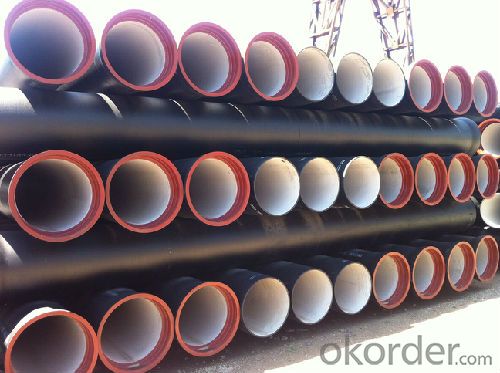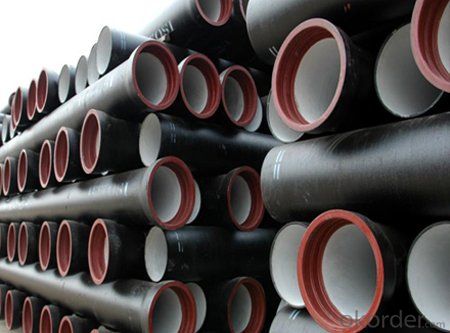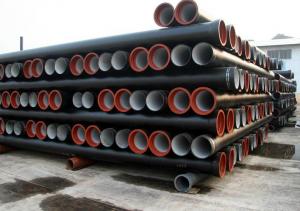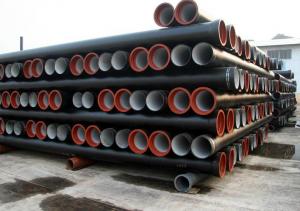Ductile Iron Pipe ISO8179 DN150-DN900 of Low Price
- Loading Port:
- China main port
- Payment Terms:
- TT or LC
- Min Order Qty:
- 1000 m
- Supply Capability:
- 500000 m/month
OKorder Service Pledge
OKorder Financial Service
You Might Also Like
1. Ductile Iron Pipe Description :
It has high strength & hardnes as steel and better corrosin resistance than steerl and grey iron, I ductile iron pipe is the ideal substute for gray cast iron pipe and common steel pipe. In addition, our DI pipes are produced with good straightness, identical wall thickness, high dimension accuracy, smooth surface finished, remarkable mechanical properties and firmly sticking internal & external coating layer as well. Flexible Push-in joint and rubber gasket are used for more convenient installation of pipelines.
2. Ductile Iron Pipe Main Features:
1. ISO 2531 or EN 545 Standard K9 Class, K7 Class and C Class
2. ISO 9001 Certificate
3. ISO 2531 & EN 545 Certificate
4. WRAS Potable Water Certificate for Cemen Internal Lining
5. WRAS EPDM Rubber Gasket or NBR Rubber Gasket
6. DN80mm - DN2600mm
7. Black Bitumen or Blue Epoxy Coating
8. Lengh = 6m or cut into 5.6m, 5.7m, 5.8m
9. Client's Brand Customization Allowable
10. Container or Bulk Loading / Shipping
3.Ductile Iron Pipe Images:


4.Ductile Iron Pipe Specification:
1.Standard:ISO2531,EN545,EN598
2.Effective Length:6m/5.7m
3.Internal Lining :Cement mortar, Cement mortar Plus Epoxy
4.External coating:Zinc Primer Plus Bitumen or PE
5. Shipment: By bulk ship or 20'/40' container
6. Rubber: NBR, SBR, EPDM according to ISO4633/EN681.1
7.Quick Delivery
5.FAQ:
Here some questions always been asked
· Industry experience over 20 years.
· Management Systems-Internal Software
· Finished Product Inventory-More Than 5000 Tons.
· Raw Material inventory -Over 8000 Mertic Tons.
· The most convenient transport and prompt delivery.
· Competitive price with best service .
· High technical production line with top quality products.
· High reputation based on best quality products.
- Q:What are the different pressure classes available for ductile iron pipe?
- The different pressure classes available for ductile iron pipe include Class 100, Class 150, Class 200, Class 250, Class 300, Class 350, and Class 400.
- Q:Can ductile iron pipes be used for underground hydrocarbon pipelines?
- Yes, ductile iron pipes can be used for underground hydrocarbon pipelines. Ductile iron is a strong and durable material that is commonly used in various applications including water and sewage systems, gas pipelines, and even hydrocarbon pipelines. Ductile iron pipes have excellent corrosion resistance properties and can withstand high pressures, making them suitable for transporting hydrocarbons underground. However, it is important to consider factors such as the specific composition of the hydrocarbons being transported and the environmental conditions of the pipeline route to ensure proper material selection and corrosion protection measures are implemented.
- Q:Are ductile iron pipes resistant to environmental stress cracking?
- Yes, ductile iron pipes are highly resistant to environmental stress cracking.
- Q:How does ductile iron pipe perform in areas with high ground movement?
- Ductile iron pipe performs exceptionally well in areas with high ground movement. Its unique properties and design make it highly resistant to deformation and damage caused by ground shifting, settling, or seismic activities. The ductility of the material allows it to withstand significant stress and strain without fracturing or breaking. Unlike rigid materials such as cast iron or PVC, ductile iron pipe has the ability to flex and absorb ground movement, which prevents catastrophic failures and ensures the integrity of the pipeline system. Additionally, ductile iron pipe is manufactured with a variety of joint configurations that further enhance its performance in areas with high ground movement. Flexible joints, such as restrained joints or mechanical joints, accommodate the movement by allowing limited rotation and translation, minimizing the potential for pipe separation or joint failure. Furthermore, the robust construction of ductile iron pipe, which includes a thick wall thickness and a high tensile strength, provides additional protection against ground movement. This strength helps the pipe withstand external loads and forces induced by the ground, preventing deformation and maintaining its structural integrity. In conclusion, ductile iron pipe is an ideal choice for areas with high ground movement due to its exceptional ductility, joint flexibility, and robust construction. Its ability to absorb ground movement without compromising the pipeline system's functionality or safety makes it a reliable and durable option in such challenging environments.
- Q:Are ductile iron pipes suitable for use in cold climates?
- Ductile iron pipes are well-suited for cold climates due to their exceptional strength and durability. This makes them a reliable choice for various applications, such as water supply systems, sewage systems, and industrial piping. In freezing temperatures, ductile iron pipes are highly resistant to cracking or breaking. This is because of their unique metallurgical composition and structure. They possess a high tensile strength and can endure the expansion and contraction resulting from freezing and thawing cycles. Additionally, their smooth internal surface prevents ice or sediment buildup, ensuring efficient flow and reducing the risk of blockages. Overall, ductile iron pipes are a dependable and appropriate option for use in cold climates.
- Q:Are ductile iron pipes suitable for power plant applications?
- Yes, ductile iron pipes are suitable for power plant applications. Ductile iron pipes are known for their high strength and durability, making them capable of withstanding the high-pressure and high-temperature conditions typically found in power plants. Additionally, ductile iron pipes have excellent corrosion resistance, which is crucial in power plant environments where water and chemicals are often present.
- Q:Can ductile iron pipe be used for desalination plants?
- Yes, ductile iron pipe can be used for desalination plants. Ductile iron has excellent corrosion resistance properties, making it suitable for handling the corrosive nature of desalinated water. Additionally, its high strength and durability make it a reliable choice for transporting water in such plants.
- Q:Can ductile iron pipes be used in areas with high levels of heavy metal contamination?
- Ductile iron pipes can indeed be used in areas with high levels of heavy metal contamination. Ductile iron is a strong and durable material that is resistant to corrosion, making it suitable for various environmental conditions, including areas with heavy metal contamination. The high levels of heavy metals in the surrounding soil or water do not affect the structural integrity or performance of ductile iron pipes. These pipes have a protective lining, usually made of cement mortar or polyethylene, which acts as a barrier between the pipe and the surrounding environment. This lining prevents the heavy metals from leaching into the water flowing through the pipes. Furthermore, ductile iron pipes have been proven to be highly resistant to chemical corrosion, including the corrosion caused by heavy metals. They have been extensively used in industrial applications where heavy metal contamination is common, such as wastewater treatment plants, industrial facilities, and mining sites. However, it is important to note that while ductile iron pipes can withstand high levels of heavy metal contamination, regular monitoring and maintenance are still necessary. This ensures that the protective lining remains intact and any potential issues are addressed promptly. In summary, ductile iron pipes are a suitable choice for areas with high levels of heavy metal contamination. Their strength, durability, and resistance to corrosion make them reliable for transporting water and other fluids, even in challenging environments.
- Q:How is ductile iron pipe manufactured?
- Ductile iron pipe is manufactured through a specific process known as centrifugal casting. The process starts with the melting of iron in a furnace, where specific elements such as carbon and silicon are added to achieve the desired properties. Once the iron is melted, it is poured into a spinning mold or a die that is rotating at a high speed. As the molten iron is poured into the rotating mold, centrifugal force pushes the liquid metal towards the inner surface of the mold. This force causes the metal to solidify from the outer surface inward. This results in a pipe with a dense outer layer and a more porous inner layer. The centrifugal casting process ensures that the pipe's outer surface is free from impurities and defects, ensuring its strength and durability. After the pipe has solidified, it is removed from the mold and undergoes further processing. The pipe is cleaned, excess material is trimmed off, and any surface imperfections are removed. It is then treated with a protective coating, such as zinc or epoxy, to enhance its corrosion resistance. The final step in the manufacturing process is quality control and testing. Ductile iron pipes are subjected to various tests to ensure they meet the required standards, including hydrostatic pressure testing, dimensional inspection, and internal and external coating inspection. In summary, ductile iron pipe is manufactured through the centrifugal casting process, which involves melting iron, pouring it into a rotating mold, and allowing it to solidify under centrifugal force. The resulting pipe is then cleaned, coated, and undergoes rigorous quality control to ensure its strength, durability, and adherence to standards.
- Q:How are ductile iron pipes protected during transportation and storage?
- Various methods are employed to protect ductile iron pipes during transportation and storage, ensuring their integrity and preventing potential damage. The first step involves applying a protective layer, such as epoxy or zinc, to act as a barrier against corrosion. This coating effectively safeguards the pipes from moisture and other corrosive elements during transit and storage. To further safeguard the pipes, they are often bundled together and secured with straps or bands, preventing any movement or shifting that could cause mechanical damage. This bundling not only ensures the pipes remain intact but also facilitates easier handling and transportation in an organized manner. During transportation, the pipes are typically loaded onto pallets or placed in crates, providing additional protection and stability. This minimizes the risk of accidental impact or rough handling that may result in cracks or fractures. Proper labeling and marking of the pipes is crucial to ensure appropriate handling. This includes displaying handling instructions, weight limits, and pipe specifications, preventing mishandling and damage during transportation. Equally important are the storage conditions for maintaining the integrity of ductile iron pipes. They should be stored in a clean, dry, and well-ventilated area, protecting them from moisture and humidity. Direct sunlight and extreme temperatures should be avoided to prevent any potential degradation of the protective coating. In conclusion, protecting ductile iron pipes during transportation and storage involves the application of protective coatings, bundling and securing, suitable packaging materials, proper handling and labeling, and storage in appropriate conditions. These measures guarantee the pipes' quality and structural integrity, ensuring they arrive at their destination in optimal condition.
1. Manufacturer Overview |
|
|---|---|
| Location | |
| Year Established | |
| Annual Output Value | |
| Main Markets | |
| Company Certifications | |
2. Manufacturer Certificates |
|
|---|---|
| a) Certification Name | |
| Range | |
| Reference | |
| Validity Period | |
3. Manufacturer Capability |
|
|---|---|
| a)Trade Capacity | |
| Nearest Port | |
| Export Percentage | |
| No.of Employees in Trade Department | |
| Language Spoken: | |
| b)Factory Information | |
| Factory Size: | |
| No. of Production Lines | |
| Contract Manufacturing | |
| Product Price Range | |
Send your message to us
Ductile Iron Pipe ISO8179 DN150-DN900 of Low Price
- Loading Port:
- China main port
- Payment Terms:
- TT or LC
- Min Order Qty:
- 1000 m
- Supply Capability:
- 500000 m/month
OKorder Service Pledge
OKorder Financial Service
Similar products
New products
Hot products
Hot Searches
Related keywords




























